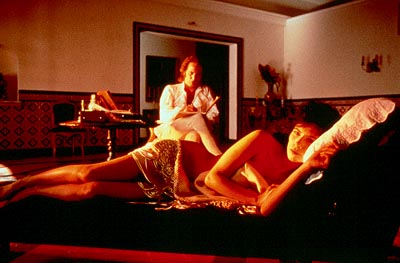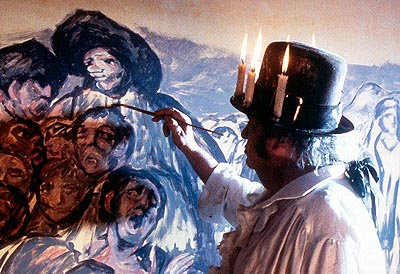Goya in Bordeaux


There are often movies about art, but few movies that are art. Goya in Bordeaux is one of those latter movies. It is less a movie and more a man looking back on his life, reflecting on his accomplishments. That man is Spanish artist Francisco Goya (1746-1828), with the help of director Carlos Saura (Tango, Taxi). Saura places the film during Goya's final years, exiled in Bordeaux. Goya (Francisco Rabal, Moonfish, Just Run!) lives there with his lover and his children. One in particular, Rosario (Daphne Fernandez), wants to be an artist. She is listening to everything Goya says with intense interest. Saura uses her as the narrative device by having Goya talk to her about his life.
It is not the story of Goya in Bordeaux that is hypnotic. There really is no story, merely fragments of memories. Goya seems to focus on his attraction to Cayetana, the Duchess of Alba (Maribel Verdu, Y Tu Mama Tambien, Enthusiasm). They are both known for their lust, and it takes a while before a younger Goya (Jose Coronado, El Coyote, The Naked Eye) and Cayetana actually consummate their relationship. The past and present weave together, almost frustratingly so at times. It is hard to distinguish sometimes whether Goya is reminiscing or having delusions. Goya in Bordeaux is not for the impatient. Still, Rabal's performance is good. Goya is deaf and near death, and gets worse as the movie progresses. Rabal seems also to physically worsen. At times, Coronado and Rabal repeat each other's lines and even meet each other at one point. As with all art, many of the sequences are open to the interpretation of the viewer.
What is great about this movie are the sets. Walls become transparent with backlighting, helping to transform the present into the past. Saura uses light and shadow effectively, changing the tone of a scene with the addition of a bright spotlight. Everything looks like an elaborate stage play. Goya will be in his bedroom and think about a memory. The lights dim around him, and when they brighten, he is standing in the past, observing himself. His bedroom is gone, replaced with something else. The best scenes show Goya at work, painting his subjects. There are only a couple of them though, and then the paintings turn Pageant of the Masters on Goya. And not much insight is given into his thought process. He does explain some things to people, but they tend to be enigmatic instead of revealing. Most of the effect of Goya in Bordeaux is visual. It all looks wonderful, but it would have been nice to have a little more going on mentally.